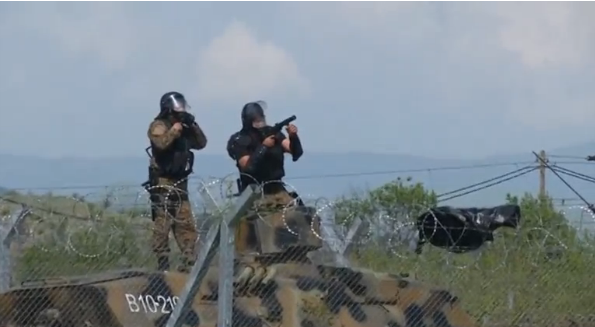
IDOMENI, Greece (Reuters) – Greece on Sunday (April 10) condemned as “dangerous and deplorable” the use of teargas, rubber bullets and stun grenades by the Macedonian police against crowds of stranded migrants that attempted to break through the border fence.
Aid agency Doctors without Borders said its medics at the camp treated more than 200 people from the effects of tear gas and other protest-related wounds.
The escalation in tensions that have been simmering for weeks came after more than 500 people gathered at the fence at the sprawling tent city of Idomeni, where more than 11,000 migrants and refugees have been stranded since February after a cascade of border shutdowns throughout the Balkans.
Mahmoud, a 23-year-old migrant from Aleppo, said he Macedonian forces shot him with a rubber bullet at close range and broke his arm. He was waiting in a bus to be taken to a local hospital.
”We were surprised that even before we reached the fence and before we did anything on our part, that they fired tear gas immediately. So we were dispersed but there was a reaction. The tear gas was used and very closely followed by firing stun grenades and rubber bullets. It was not gradual, they used it all immediately one after the other and this caused a negative reaction from the protesters and angered them and enraged them,” he said not wanting his face to be filmed.
Macedonian police also fired water cannons and pepper spray.
Greece said police on the Macedonian side of their joint frontier used teargas, rubber bullets and stun grenades to push back the migrants. Macedonian authorities would only confirm they used teargas.
In an unusually strong statement, George Kyritsis, a spokesman for migration coordinators in the Greek government, said the use of force was unacceptable.
“The extensive use of tear gas, stun grenades and even rubber bullets indiscriminately amidst women and children and for hours, is a deplorable and extremely dangerous practice, and we believe that the authorities of the Former Yugoslav Republic of Macedonia (FYROM) need to understand the risks inherent in attacking refugees and migrants (in such a way). At the same time, we call on refugees to not trust and to not believe in the lies that, with criminal negligence, are told to them regarding the borders. They must understand that the borders are closed,” Kyritsis told Reuters Television.
Greek authorities have been trying to convince the population to move to reception camps, but migrants have been refusing to move.







